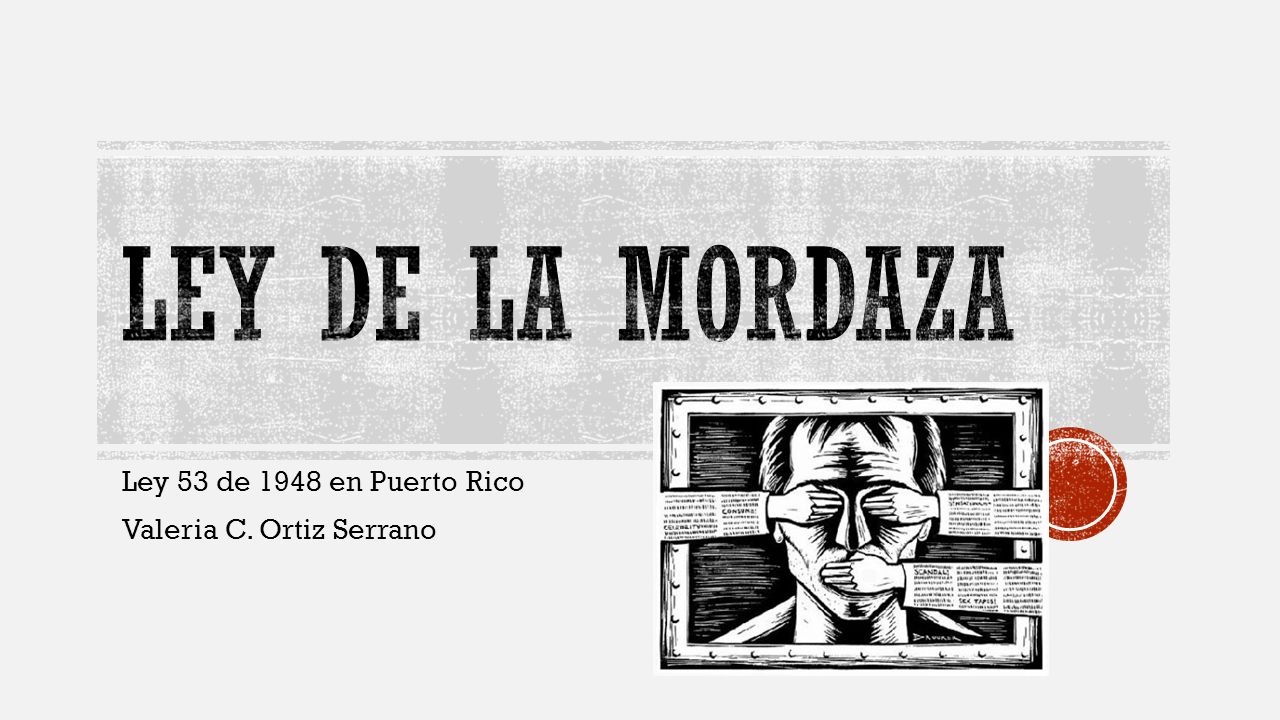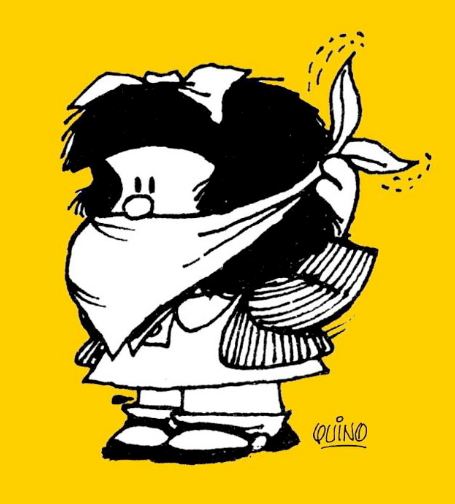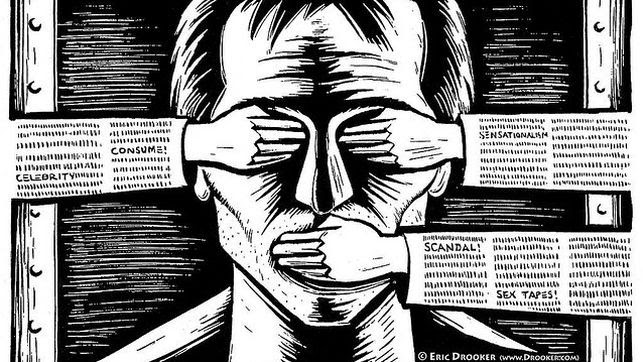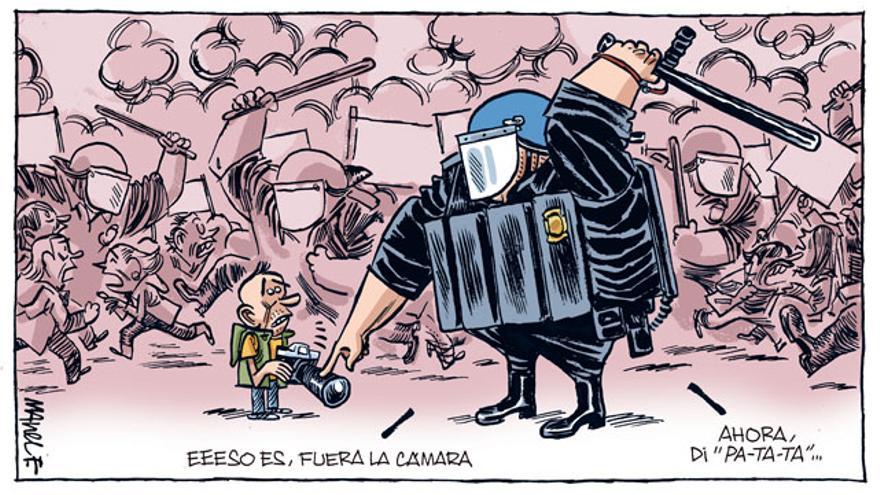3:54 AM 11/22/2018 - Ley mordaza - Law 53 of Puerto Rico
- Get link
- X
- Other Apps
Next Page of Stories
Loading...
Page 2
Law 53 of Puerto Rico
From Wikipedia, the free encyclopedia
These deficiencies were found on June 11, 2010.
|
On May 21, 1948, the Legislative Assembly of Puerto Rico under the Popular Democratic Party (PDP), approved in session three bills aimed at punishing any action against the Government of the Island. It is not until June 10 of the same year that it becomes Law 53 that declared "serious crime to encourage, advocate and advise or preach, voluntarily or knowingly, the need, desirability or convenience to overthrow, destroy or paralyze the Insular Government by force or violence. " It also includes as a crime the printing, publishing, editing, selling, exhibiting or organizing or helping to organize any society, group or assembly of people that encourage the intention to overthrow, paralyze or destroy the Insular Government. As a penalty, it is constituted with a maximum of 10 years in prison, $ 10,000 fine or both for committing such acts celebrated by a court of law. This law was named by Representative Leopoldo Figueroa as what we know today as the "Gag Law", who considered this law a "gross copy of the North American Smith Law and is part of the repressive and tempting legislation of freedom of expression and a violation of civil rights. "
Background [ edit ]
1940: In June of 1940 the Smith Law was approved in the United States . This law classified as a crime "advocate, encourage or teach the desirability of overthrowing the government of the United States or the government of any of its States, Territories, Districts or Possessions, by force or violence or the killing of any officer said government". The law punished both printed and verbal expressions, it also punished the organization of any group for this purpose. One of the objectives for this law was to identify and eliminate any possible internal conflict in the militant nation as the entry of the United States in World War II approached.
1947: Law 447 was approved in the Congress of the United States that empowered the people of Puerto Rico to elect their own governor. On December 20, the Independence Party is registered in time for the next elections to be held in 1948. In December of this year Pedro Albizu Campos returns to Puerto Rico
1948: in the early hours of the morning of May 21, House Projects 23, 24 and 25 are approved by the Legislative Assembly controlled by the Popular Democratic Party of Puerto Rico (PPD) that immediately caused intimidation in anyone who will harbor independence feelings. On May 22, every Puerto Rican newspaper titled the approved project. The negative reaction of the public was so intense before the approval of the projects that forced people in the government to assume public defense.
June 1948 [ edit ]
On June 11, 1948, the Governor of Puerto Rico, Jesús T. Piñero , signed a law that made illegal the public invocation of independence, which was consistent with the projects approved the previous month. It was called Law Number 53 which stipulated the following:
"To declare a felony to encourage, advocate, advise or preach, voluntarily or knowingly, the need, desirability or convenience of overthrowing, destroying or paralyzing the Insular Government, or any political subdivision thereof, by means of force or violence; and print, publish, edit, circulate, sell, distribute or publicly display with the intention of overthrowing, paralyzing or destroying the Insular Government or any of its political divisions, any writing or publication that promotes, advocates, advises or preaches the need , the desirability or convenience of overthrowing, paralyzing or destroying the Insular Government or any political subdivision thereof, by means of force or violence, as well as organizing or helping to organize any society, group or assembly of persons who promote, advocate ,
Article 1 - It shall constitute a felony, punishable by a maximum penalty of imprisonment of ten years or a maximum fine of $ 10.00, or both penalties, the commission by any person of any of the following acts:
1. encourage, advocate, advise or preach, voluntarily or knowingly, the need, desirability or convenience of overthrowing, destroying or paralyzing the Insular Government, or any political subdivision thereof, by means of force or violence
2. print, publish, edit, circulate, sell, distribute or publicly display with the intention of overthrowing, paralyzing or destroying the Insular Government or any of its political divisions, any writing or publication that encourages, advocates, advises or preaches the need , the desirability or desirability of overthrowing, paralyzing or destroying the Insular Government or any political subdivision thereof, by force or violence
3. organize or assist in organizing any society, group or assembly of persons that encourage, advocate, advise or preach the repeal or destruction of the insular government, or any political subdivision thereof, by means of force or violence
Article 2 - Any judgment that is held for any violation of this Law must be held by a court of law
Article 3 - If part of this Law is declared unconstitutional, the rest of it must replace in all its force.
Article 4 - This Act, being of an urgent and necessary nature, shall take effect immediately after its approval June 10, 1948
The objective of this Gag Law was to investigate and stop the militant nationalism, the Nationalist Partyand its leader, Albizu Campos, since he had been accused of initiating strike movements at the University of Puerto Rico.
Results of the Law [ edit ]
As soon as Law 53, better known as the Gag Law, was passed, a decade of political repression was unleashed. This law helps the new governor to exercise his position without fear of getting rid of the political opposition, especially the pro-independence and nationalist sector. In the general elections of 1948, Luis Muñoz Marín was elected as the first Puerto Rican governor chosen by the vote of the people of Puerto Rico, and on January 2, 1949 he officially took office. Factors such as legalized repression through the Gag Law, the instability of the colonial status and the change of position of the governor to desist seeking independence led the people of Puerto Rico to grow in rancor. With the arrival and help of the leader Pedro Albizu Campo begins to prepare an uprising in arms.Shout of Jayuya . In Jayuya the most important action occurs, the town being captured by nationalists. Other towns such as Peñuelas, Ponce, Arecibo, Utuado, Naranjito and Mayagüez also have actions in which nationalists and police are dead. In addition, an attack was carried out in La Fortaleza, the house of Governor Muñoz Marín , by a group of five nationalists with the intention of killing the governor. Four years later, the United States Capitol and the Blair house, where American President Harry Trumanwas staying, were attacked . After these events the first arrest is made for violation of Law 53. The arrested was the leader of the Nationalist Party Pedro Albizu Campos. Along with this arrest, mass arrests begin to interrogate participants of the Nationalist and Independence Parties. Years later, many articles were written about this event. One article that explains the legislative history of this law was the article by David M. Helfeld (1964) entitled "Discrimination for Political Beliefs and Associations". Helfeld argues that this law was applied rather against nationalist leaders and supporters, just as it was used to annoy and intimidate people and minority groups to avoid a revolution.
References [ edit ]
Partsch, J. «The Government of Jesus T. Piñero and the Cold War» . Retrieved on April 3, 2010 .
Ortiz Santini, F. «" The Gag ".» . Archived from the original on September 18, 2009 . Retrieved on April 3, 2010 .
Acosta Lespier ,, Ivonne (2008). The Gag . Editorial EDIL.
Delgado Cintron, C. (September 1976). The Great Encyclopedia of Puerto Rico . Puerto Rico in the Hand and The Great Encyclopedia of Puerto Rico, Inc. San Juan.
Laws of the Sixth and Eighth Extraordinary Legislatures of the Sixteenth Legislature of Puerto Rico . San Juan, Printing Division. 1948
Helfeld, DM (1964). «Discrimination for Political Beliefs and Associations». Journal of the Puerto Rico Bar Association 25 .
Read the whole story
· · · · · ·
Ley mordaza
De Wikipedia, la enciclopedia libre
«Ley mordaza» es un término que se acuña a una ley, en la que se declara delitos libertades tales como la de expresión, información o manifestación. También se denominan leyes mordazas cuando se restringen o limitan por ley actividades que antes se consideraban lícitas. Algunas de las leyes conocidas por haber sido calificadas así son:
En América[editar]
- Ley 53 de Puerto Rico, ley aprobada en 1948.
- Ley Mordaza Global (Estados Unidos), Global Gag Rule o Política estadounidense respecto al aborto en la ciudad de México.
- Ley de Responsabilidad Social en Radio y Televisión, también conocida como Ley RESORTE, ley aprobada por la Asamblea Nacional de Venezuela, vigente desde el 7 de diciembre de 2004, cuyo objeto es el de establecer la responsabilidad social de los prestadores de los servicios de radio y televisión.
- Ley mordaza del sector agropecuario (Ag-gag), para la industria agrícola.
En Europa[editar]
- DDL intercettazioni o ley de escuchas telefónicas, propuesta de ley presentada en el Parlamento de la República Italiana en 2008.
- Ley Orgánica de protección de la seguridad ciudadana (2015) (España), ley española cuyo anteproyecto se presentó el 29 de noviembre de 2013, basándose en la Ley Orgánica sobre Protección de la Seguridad Ciudadana de 1992. Esta ley entró en vigor el 1 de julio de 2015 y entre sus infracciones se encuentran las que se producirán al incumplir las normas de celebración de reuniones y manifestaciones, fotografiar o grabar a policías cuando esto pueda poner en peligro la seguridad personal o familiar de los agentes, de las instalaciones protegidas o en riesgo el éxito de una operación, los actos de obstrucción que pretendan impedir a cualquier autoridad, empleado público o corporación oficial el ejercicio legítimo de sus funciones, entre otras.

Flip to back Flip to front


Law 53 of Puerto Rico
From Wikipedia, the free encyclopedia
These deficiencies were found on June 11, 2010.
|
On May 21, 1948, the Legislative Assembly of Puerto Rico under the Popular Democratic Party (PDP), approved in session three bills aimed at punishing any action against the Government of the Island. It is not until June 10 of the same year that it becomes Law 53 that declared "serious crime to encourage, advocate and advise or preach, voluntarily or knowingly, the need, desirability or convenience to overthrow, destroy or paralyze the Insular Government by force or violence. " It also includes as a crime the printing, publishing, editing, selling, exhibiting or organizing or helping to organize any society, group or assembly of people that encourage the intention to overthrow, paralyze or destroy the Insular Government. As a penalty, it is constituted with a maximum of 10 years in prison, $ 10,000 fine or both for committing such acts celebrated by a court of law. This law was named by Representative Leopoldo Figueroa as what we know today as the "Gag Law", who considered this law a "gross copy of the North American Smith Law and is part of the repressive and tempting legislation of freedom of expression and a violation of civil rights. "
Background [ edit ]
1940: In June of 1940 the Smith Law was approved in the United States . This law classified as a crime "advocate, encourage or teach the desirability of overthrowing the government of the United States or the government of any of its States, Territories, Districts or Possessions, by force or violence or the killing of any officer said government". The law punished both printed and verbal expressions, it also punished the organization of any group for this purpose. One of the objectives for this law was to identify and eliminate any possible internal conflict in the militant nation as the entry of the United States in World War II approached.
1947: Law 447 was approved in the Congress of the United States that empowered the people of Puerto Rico to elect their own governor. On December 20, the Independence Party is registered in time for the next elections to be held in 1948. In December of this year Pedro Albizu Campos returns to Puerto Rico
1948: in the early hours of the morning of May 21, House Projects 23, 24 and 25 are approved by the Legislative Assembly controlled by the Popular Democratic Party of Puerto Rico (PPD) that immediately caused intimidation in anyone who will harbor independence feelings. On May 22, every Puerto Rican newspaper titled the approved project. The negative reaction of the public was so intense before the approval of the projects that forced people in the government to assume public defense.
June 1948 [ edit ]
On June 11, 1948, the Governor of Puerto Rico, Jesús T. Piñero , signed a law that made illegal the public invocation of independence, which was consistent with the projects approved the previous month. It was called Law Number 53 which stipulated the following:
"To declare a felony to encourage, advocate, advise or preach, voluntarily or knowingly, the need, desirability or convenience of overthrowing, destroying or paralyzing the Insular Government, or any political subdivision thereof, by means of force or violence; and print, publish, edit, circulate, sell, distribute or publicly display with the intention of overthrowing, paralyzing or destroying the Insular Government or any of its political divisions, any writing or publication that promotes, advocates, advises or preaches the need , the desirability or convenience of overthrowing, paralyzing or destroying the Insular Government or any political subdivision thereof, by means of force or violence, as well as organizing or helping to organize any society, group or assembly of persons who promote, advocate ,
Article 1 - It shall constitute a felony, punishable by a maximum penalty of imprisonment of ten years or a maximum fine of $ 10.00, or both penalties, the commission by any person of any of the following acts:
1. encourage, advocate, advise or preach, voluntarily or knowingly, the need, desirability or convenience of overthrowing, destroying or paralyzing the Insular Government, or any political subdivision thereof, by means of force or violence
2. print, publish, edit, circulate, sell, distribute or publicly display with the intention of overthrowing, paralyzing or destroying the Insular Government or any of its political divisions, any writing or publication that encourages, advocates, advises or preaches the need , the desirability or desirability of overthrowing, paralyzing or destroying the Insular Government or any political subdivision thereof, by force or violence
3. organize or assist in organizing any society, group or assembly of persons that encourage, advocate, advise or preach the repeal or destruction of the insular government, or any political subdivision thereof, by means of force or violence
Article 2 - Any judgment that is held for any violation of this Law must be held by a court of law
Article 3 - If part of this Law is declared unconstitutional, the rest of it must replace in all its force.
Article 4 - This Act, being of an urgent and necessary nature, shall take effect immediately after its approval June 10, 1948
The objective of this Gag Law was to investigate and stop the militant nationalism, the Nationalist Partyand its leader, Albizu Campos, since he had been accused of initiating strike movements at the University of Puerto Rico.
Results of the Law [ edit ]
As soon as Law 53, better known as the Gag Law, was passed, a decade of political repression was unleashed. This law helps the new governor to exercise his position without fear of getting rid of the political opposition, especially the pro-independence and nationalist sector. In the general elections of 1948, Luis Muñoz Marín was elected as the first Puerto Rican governor chosen by the vote of the people of Puerto Rico, and on January 2, 1949 he officially took office. Factors such as legalized repression through the Gag Law, the instability of the colonial status and the change of position of the governor to desist seeking independence led the people of Puerto Rico to grow in rancor. With the arrival and help of the leader Pedro Albizu Campo begins to prepare an uprising in arms.Shout of Jayuya . In Jayuya the most important action occurs, the town being captured by nationalists. Other towns such as Peñuelas, Ponce, Arecibo, Utuado, Naranjito and Mayagüez also have actions in which nationalists and police are dead. In addition, an attack was carried out in La Fortaleza, the house of Governor Muñoz Marín , by a group of five nationalists with the intention of killing the governor. Four years later, the United States Capitol and the Blair house, where American President Harry Trumanwas staying, were attacked . After these events the first arrest is made for violation of Law 53. The arrested was the leader of the Nationalist Party Pedro Albizu Campos. Along with this arrest, mass arrests begin to interrogate participants of the Nationalist and Independence Parties. Years later, many articles were written about this event. One article that explains the legislative history of this law was the article by David M. Helfeld (1964) entitled "Discrimination for Political Beliefs and Associations". Helfeld argues that this law was applied rather against nationalist leaders and supporters, just as it was used to annoy and intimidate people and minority groups to avoid a revolution.
References [ edit ]
Partsch, J. «The Government of Jesus T. Piñero and the Cold War» . Retrieved on April 3, 2010 .
Ortiz Santini, F. «" The Gag ".» . Archived from the original on September 18, 2009 . Retrieved on April 3, 2010 .
Acosta Lespier ,, Ivonne (2008). The Gag . Editorial EDIL.
Delgado Cintron, C. (September 1976). The Great Encyclopedia of Puerto Rico . Puerto Rico in the Hand and The Great Encyclopedia of Puerto Rico, Inc. San Juan.
Laws of the Sixth and Eighth Extraordinary Legislatures of the Sixteenth Legislature of Puerto Rico . San Juan, Printing Division. 1948
Helfeld, DM (1964). «Discrimination for Political Beliefs and Associations». Journal of the Puerto Rico Bar Association 25 .
Read the whole story
· · · · · ·
Ley mordaza
De Wikipedia, la enciclopedia libre
«Ley mordaza» es un término que se acuña a una ley, en la que se declara delitos libertades tales como la de expresión, información o manifestación. También se denominan leyes mordazas cuando se restringen o limitan por ley actividades que antes se consideraban lícitas. Algunas de las leyes conocidas por haber sido calificadas así son:
En América[editar]
- Ley 53 de Puerto Rico, ley aprobada en 1948.
- Ley Mordaza Global (Estados Unidos), Global Gag Rule o Política estadounidense respecto al aborto en la ciudad de México.
- Ley de Responsabilidad Social en Radio y Televisión, también conocida como Ley RESORTE, ley aprobada por la Asamblea Nacional de Venezuela, vigente desde el 7 de diciembre de 2004, cuyo objeto es el de establecer la responsabilidad social de los prestadores de los servicios de radio y televisión.
- Ley mordaza del sector agropecuario (Ag-gag), para la industria agrícola.
En Europa[editar]
- DDL intercettazioni o ley de escuchas telefónicas, propuesta de ley presentada en el Parlamento de la República Italiana en 2008.
- Ley Orgánica de protección de la seguridad ciudadana (2015) (España), ley española cuyo anteproyecto se presentó el 29 de noviembre de 2013, basándose en la Ley Orgánica sobre Protección de la Seguridad Ciudadana de 1992. Esta ley entró en vigor el 1 de julio de 2015 y entre sus infracciones se encuentran las que se producirán al incumplir las normas de celebración de reuniones y manifestaciones, fotografiar o grabar a policías cuando esto pueda poner en peligro la seguridad personal o familiar de los agentes, de las instalaciones protegidas o en riesgo el éxito de una operación, los actos de obstrucción que pretendan impedir a cualquier autoridad, empleado público o corporación oficial el ejercicio legítimo de sus funciones, entre otras.

Flip to back Flip to front


NPR |
Advocates Fight 'Culture of Secrecy' In Post-Hurricane Puerto Rico
NPR Are contracts ending up in the hands of firms with close ties to politicians in power? Is the funding stimulating Puerto Rico's economy, as officials have claimed it will, or are most contracts going to U.S. firms that will take their profits back to ... and more » |
WNCW |
Advocates Fight 'Culture of Secrecy' In Post-Hurricane Puerto Rico
WNCW It was a more than 400-page report that the governor, Ricardo Rosselló, planned to send to Congress outlining his vision for the island's reconstruction and his need for $140 billion to see it through. Before delivering it in August, the government ... |
- Get link
- X
- Other Apps







Comments
Post a Comment